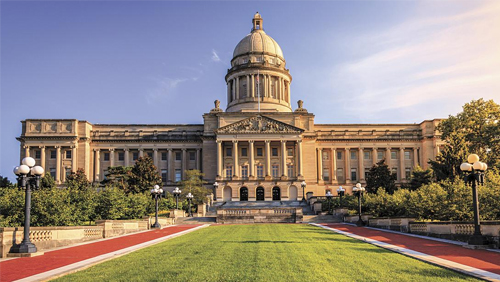Kentucky continues to inch forward with its plans to introduce sports gambling. A House committee in the state unanimously approved a bill this week that could conceivably open the doors to the activity, but there is still a long road ahead before it finally is given the green light.
 Representative Adam Koenig introduced House Bill (HB) 175 in an effort to allow the state’s residents to gamble on sports at the horse racetracks, as well as the Kentucky Speedway and through mobile applications. The last is always the most contentious part of virtually any sports gambling legislation and, as has been seen in other states, gamblers would first be required to register in person at one of the new sportsbooks. In addition, the bill would allow both online poker and daily fantasy sports wagers, as well.
Representative Adam Koenig introduced House Bill (HB) 175 in an effort to allow the state’s residents to gamble on sports at the horse racetracks, as well as the Kentucky Speedway and through mobile applications. The last is always the most contentious part of virtually any sports gambling legislation and, as has been seen in other states, gamblers would first be required to register in person at one of the new sportsbooks. In addition, the bill would allow both online poker and daily fantasy sports wagers, as well.
Also included in the bill is a provision that would prohibit wagers on collegiate-level sporting events. This could be changed as HB 175 makes its way through the political obstacle course, but Koenig would prefer to keep the bill mostly unchanged.
Sportsbooks would pay a 9.75% tax on all land-based revenues, as well as 14.25% on wagers placed through mobile devices. Those taxes, according to research firm Commonwealth Economics, could give Kentucky as much as $48 million each year in tax revenue – provided neighboring states don’t get into the fray. If they do, the tax revenue could possibly drop to $20 million a year.
In addition to the annual taxes, a sports gambling license, under the bill’s current setup, would cost $1 million. Considering how some states charge much higher fees – Pennsylvania’s license cost sits at $10 million, the Kentucky fee seems relatively mild.
Although the House committee showed overwhelming support for the bill, there is still much work to be done and many hurdles to jump. Along the way, there will be no doubt be lobbying introduced to thwart the bill’s passage, possibly even backed by some of the brick-and-mortar casino owners who have been in the news lately.
If HB 175 somehow manages to survive and makes it to Governor Matt Bevin’s desk, chances are good he will sign off on it. He introduced his own version of a sports gambling bill last year and has said that the activity could prove beneficial to the state’s coffers, which have become thinner over the past several years.